Beth and I are underwriting what we are calling the inaugural Hearts & Minds Summer Lecture in Pittsburgh next week, and we are grateful to the campus ministry organization, the Coalition for Christian Outreach (CCO) for their co-sponsoring and hosting the program at their training event, being held at Robert Morris University in Moon Township. You can see here the lovely poster that Ned Bustard of World’s End Images (Lancaster) created for us, that invites one and all to this book launch party, public lecture and reception with Dr. William D. Romanowski. Since most of our readers will not be able to join us in Pittsburgh, I wanted to go to some lengths to tell you about the author and the book, and our deepest reasons for caring so much about it. Skip to the end to order the book if you don’t want my backstory.
in Pittsburgh next week, and we are grateful to the campus ministry organization, the Coalition for Christian Outreach (CCO) for their co-sponsoring and hosting the program at their training event, being held at Robert Morris University in Moon Township. You can see here the lovely poster that Ned Bustard of World’s End Images (Lancaster) created for us, that invites one and all to this book launch party, public lecture and reception with Dr. William D. Romanowski. Since most of our readers will not be able to join us in Pittsburgh, I wanted to go to some lengths to tell you about the author and the book, and our deepest reasons for caring so much about it. Skip to the end to order the book if you don’t want my backstory.
So, to get it out in the open right away, Bill Romanowski is an old friend. I admired him when he came to faith our first year in college, as he played guitar for our fun fellowship groups and young adult worship times. I drove him around a bit to churches and coffeehouses where he was doing concerts; he had a couple of albums out and a decent sound system and everyone in our circle of friends enjoyed his winsome leadership, his playful shows, and his commitments to good scholarship, even as an undergrad. Some of the old gang still call him Ski.
A group of us lived together one year and were committed to trying, as best we could, to do our academic work in clearly Christian ways, bearing witness to God’s work in creation (whatever one studies, it is God’s creation!) We hoped to allow our Biblical worldviews, such as they were, to inform how we discerned what was important in the philosophy of our fields and to influence how we did our academic work. From political theory to American history to the philosophy of education, we argued with our largely secular professors, tried to write papers that made some sense of how faith might illumine the issues of the classroom, and tried to convince our brothers and sisters in the large Christian fellowship groups on campus to care about making a respectable witness in the university. We talked about God with our professors, wrote op-ed pieces in the campus newspaper, sponsored Christian concerts and lectures, and tried to get decent grades for God’s greater glory. Bill wrote a major senior paper, as I recall, on Christian perspectives on music theory. Unlike some of us–ahem, I’m not mentioning any names or confessing anything—he got an A+.
lectures, and tried to get decent grades for God’s greater glory. Bill wrote a major senior paper, as I recall, on Christian perspectives on music theory. Unlike some of us–ahem, I’m not mentioning any names or confessing anything—he got an A+.
Bill and I went on, with our new wives in the fall of 1976, to join the CCO (Coalition for Christian Outreach) the Pittsburgh-based campus ministry who years later will host our lecture, the organization whose staff had so influenced us as students, helping us learn theology and nurture the Christian mindset, helping us want to do evangelism and make disciples, but also to engage the culture around us. My concerns about world hunger and our passions for things like racial justice and creation care came alive in those years and many of us remain grateful to the older friends and mentors of the CCO who taught and modeled “whole life discipleship” which valued Bible study and politics, prayer and play, church life and work life. Beth and I, as you may know, have continued to serve the CCO as their preferred booksellers and I’m glad to be allowed to be called an Associate Staff. Reaching college students with a coherent and relevant gospel, articulated and lived in ways that are neither literal nor liberal, standing in the historic, orthodox confessional faith of the reformation, continues to be a great passion of ours and our bookstore maintains relationships not only 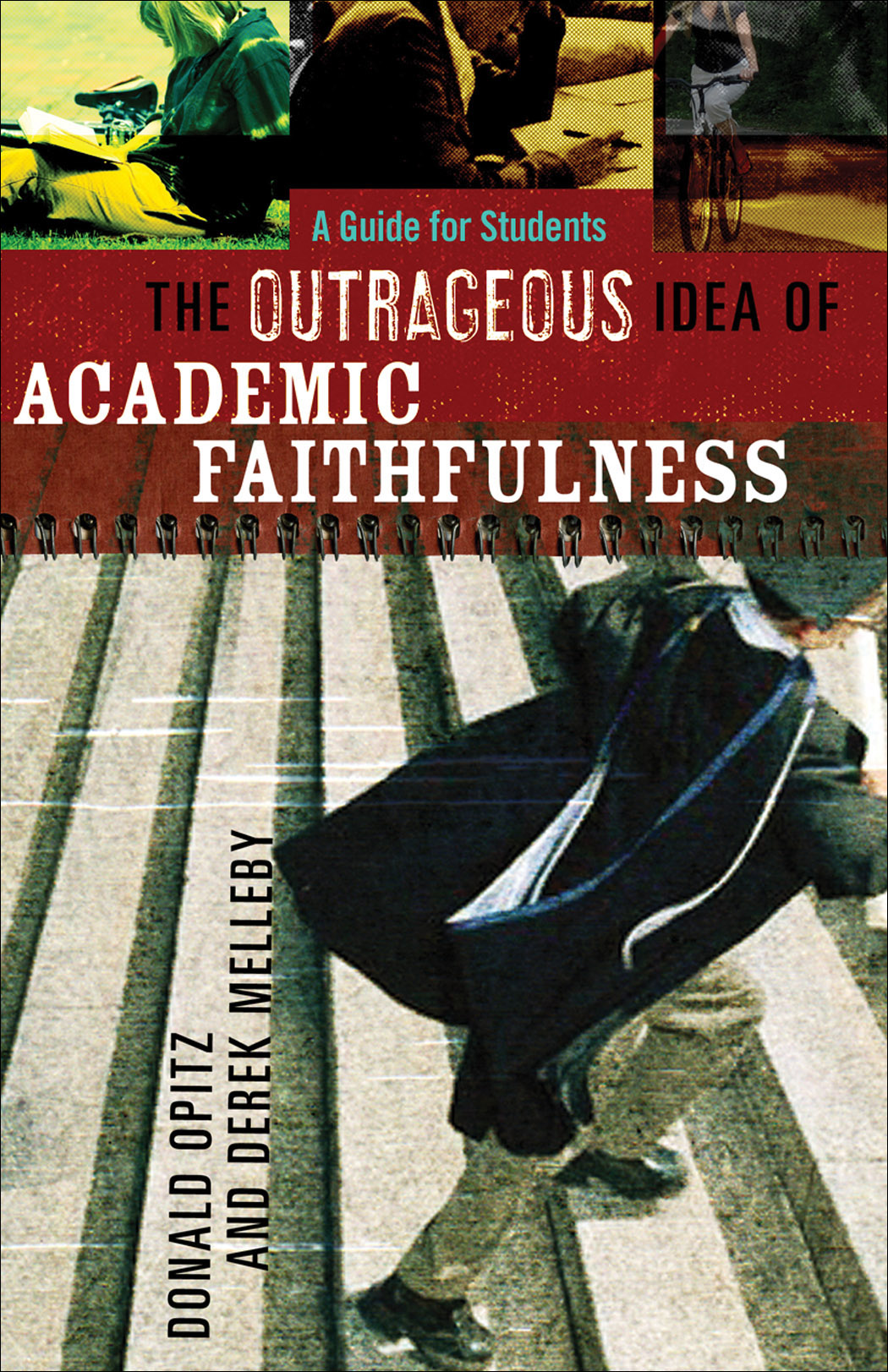 with CCO but with other creative campus ministry
with CCO but with other creative campus ministry  movements, such as IVCF. Our interest in helping students relate faith and learning is seen in our regular promotion of books like The Outrageous Idea of Academic Faithfulness by Donald Opitz & Derek Melleby (Brazos Press; $14.99) or Cornelius Plantinga’s elegant and wise Engaging God’s World: A Christian Vision of Faith, Learning, and Living (Eerdmans; $16.00.) Romanowski and our crew would have given our right arms for resources like that when we were students. Of course, he went on to write a few books, too.
movements, such as IVCF. Our interest in helping students relate faith and learning is seen in our regular promotion of books like The Outrageous Idea of Academic Faithfulness by Donald Opitz & Derek Melleby (Brazos Press; $14.99) or Cornelius Plantinga’s elegant and wise Engaging God’s World: A Christian Vision of Faith, Learning, and Living (Eerdmans; $16.00.) Romanowski and our crew would have given our right arms for resources like that when we were students. Of course, he went on to write a few books, too.
I don’t exactly know what the phrase “the past is prologue” means but I do see a grand strand, circuitous, perhaps, illustrating God’s faithfulness in the time-lines of Bill and I, from our college years through our current vocations, author and bookseller, and I wanted you to know this, at least: Romanowski has been at this effort of “thinking Christianly” a long, long time. I can vouch for that. He remains a working scholar—I got an email from him a few days ago, in fact, where he was up to his ears all day in tedious research. Further, as he is employed as a full professor of Film and Media Studies at Calvin College in Grand Rapids, it can be seen that he still works with collegiates. Bill got his PhD in the early 1990s in the study of popular culture from one of the key places to study that field. He helped a leading scholar publish a highly regarded book on rock music’s first use in movie soundtracks; he co-wrote a major book on youth ministry (showing how the study of popular culture can enhance and inform culturally-relevant and contextualized work with teens.) And he was just getting started.
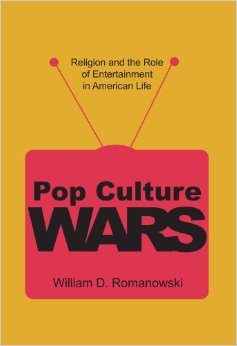 He eventually wrote a book published by InterVarsity Press (still available, now with a new cover, issued by Wipf & Stock for $43.00) called Pop Culture Wars: Religion and the Role of Entertainment in American Life. When this came out the phrase “culture wars” was just starting to be used and he carefully showed how our very assumptions about popular culture are both influenced by our cultural situation and end up influencing how we think and talk about movies and rock music and such. The art of popular artifacts were being (mis)used by those with agendas in the so-called culture wars and he opened us up to a deeper understanding.
He eventually wrote a book published by InterVarsity Press (still available, now with a new cover, issued by Wipf & Stock for $43.00) called Pop Culture Wars: Religion and the Role of Entertainment in American Life. When this came out the phrase “culture wars” was just starting to be used and he carefully showed how our very assumptions about popular culture are both influenced by our cultural situation and end up influencing how we think and talk about movies and rock music and such. The art of popular artifacts were being (mis)used by those with agendas in the so-called culture wars and he opened us up to a deeper understanding.
In a nutshell, Romanowski broke new ground by showing how the distinction between what some call “high culture” and “low culture” emerges from a certain ideological view, itself perhaps anti-immigrant and racist, from the early part of the 20th century. He showed how Vaudeville and other emerging sorts of entertainment were despised by some, demeaned in ways that dishonored their artfulness, the legitimacy of entertainment, and was colored by all sorts of Victorian baggage. To this day, we have preachers and conservative activists (and some scholars) presuming that one must think about and take seriously the ideas of “high culture” artifacts like Shakespeare, the classic books, theater, and serious cinema. Talk about the meaning of The Simpsons, dubstep or video games? T
hat’s just lowbrow and thoughtless entertainment, many would say, and we should either resist it or enjoy it without much consideration. Pop Culture Wars showed remarkable historical acumen and theological insight by exposing how the very ways in which popular entertainments were approached were fundamentally unhelpful. He argued for a robust and multi-dimensional way to appreciate, critique and engage mediums like TV and pop music videos from within a thick Christian worldview. That he was influenced by the likes of Calvin Seerveld, who is known for writing heavy books on Christian views of aesthetics and literary theory, ends up being no surprise. We were all reading Seerveld’s first books in college. Did I mention that Bill got an A on his senior thesis? The fingerprints of our late night bull sessions, prayer meetings, and his hard work as a Christian undergrad are seen all over that first major book and it remains important. Later, when a collection of serious essays were compiled to honor professor Seerveld, then retiring from the heady Institute for Christian Studies graduate school in Toronto, Bill had a piece narrating how Seerveld influenced him, and how Seerveld’s idiosyncratic theories gave him tools to think new thoughts about the quandary of popular culture. (And, too, how he introduced some current popular culture entertainments to the good-natured Professor Seerveld!)
I tell you all this to show that Romanowski has, in many ways, followed a path that is both admirable, intentional, and perhaps even uncommon. From an unchurched family, he bent the knee to the Lord Jesus in a college-age commitment that gave him new life and redemptive experiences in ways that some young adults never embrace. His commitments as a servant of the Lord (and seeing his educational and career goals as avenues of that Kingdom service and not as part of a narrative of the American dream of financial success) is a major part of this story: Bill’s artistic sensibilities, his creative work, his scholarship and his career goals all were transformed by God’s good grace, and his life subsequently re-narrated.
It seems to me that describing this particular author’s journey (about which he will be demur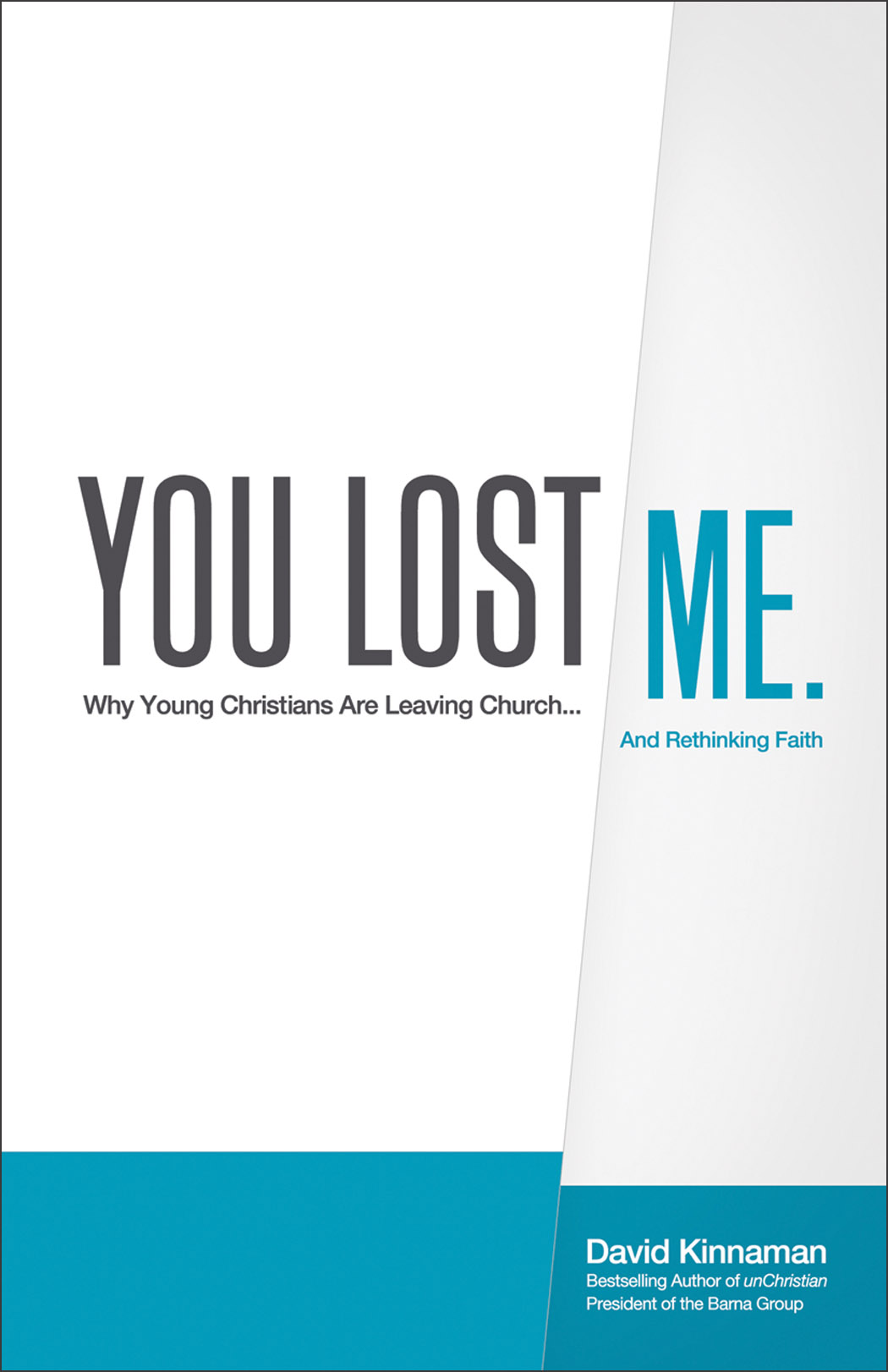 e, perhaps embarrassed) may be helpful, especially as we think about young adults drifting from church, as explained so helpfully in the hugely popular You Lost Me by David Kinnaman (Baker; $17.99.) Kinnaman, you may recall, insists that research shows that young adults drift from church and faith often because (among other reasons) they sense the church is not interested in popular culture or very affirming of creativity and the arts. And, further, many interviewees—those who have left the church in their 20s—reported that they found the church disinterested in the notion of calling, vocation, work. Bill committed his ways to the Lord, worked hard to come up with a way to integrate his faith with his life passions and skills, and ended up making a difference in his field of influence (and was helped along the way by many who had a vision of the faith as a worldview and not just a religion, a way of life, not just a set of doctrinal assertions.) Not all of us will be as successful as Romanowski, and obviously most of us will not write books or become professors at a Christian college. But, still, his story is instructive–his taking up this vocation of doing scholarly work on pop culture and, now, film history. We can be thankful for his many years of serving young adults by helping them process the entertainment culture in which they are raised, the way he has spoken at scholarly conferences and church camps alike, offering a solid, refreshing understanding about being “in but not of” the world around us. In an age of ipods, streaming videos, ubiquitous celebrity news and a grassroots renewal of indie film and music, it seems that Bill’s insights about the very nature of culture and the role of the arts are needed now more than ever.
e, perhaps embarrassed) may be helpful, especially as we think about young adults drifting from church, as explained so helpfully in the hugely popular You Lost Me by David Kinnaman (Baker; $17.99.) Kinnaman, you may recall, insists that research shows that young adults drift from church and faith often because (among other reasons) they sense the church is not interested in popular culture or very affirming of creativity and the arts. And, further, many interviewees—those who have left the church in their 20s—reported that they found the church disinterested in the notion of calling, vocation, work. Bill committed his ways to the Lord, worked hard to come up with a way to integrate his faith with his life passions and skills, and ended up making a difference in his field of influence (and was helped along the way by many who had a vision of the faith as a worldview and not just a religion, a way of life, not just a set of doctrinal assertions.) Not all of us will be as successful as Romanowski, and obviously most of us will not write books or become professors at a Christian college. But, still, his story is instructive–his taking up this vocation of doing scholarly work on pop culture and, now, film history. We can be thankful for his many years of serving young adults by helping them process the entertainment culture in which they are raised, the way he has spoken at scholarly conferences and church camps alike, offering a solid, refreshing understanding about being “in but not of” the world around us. In an age of ipods, streaming videos, ubiquitous celebrity news and a grassroots renewal of indie film and music, it seems that Bill’s insights about the very nature of culture and the role of the arts are needed now more than ever.
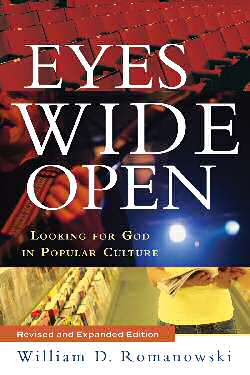 Enter Eyes Wide Open: Looking for God in Popular Culture (Brazos Press; $22.99) which I believe is the very best book on the subject. Bill wrote this shortly after Pop Culture Wars and it was written for a more popular audience — even high schools kids have enjoyed it. In that book, informed by his more academic research, he offers insights for us all to figure out how to be both appreciative and discerning of the popular entertainments we enjoy. From Hollywood blockbusters to MTV, from HBO to classic rock radio, from video games to the latest advertisement talked about at the office water cooler, his principles help us enjoy and be discerning about the world of popular culture. Few books are as accessible and insightful, as serious and as playful, as balanced and wise, as Eyes Wide Open. And few books are as foundational, essential. Since the release of its first edition, and through the expanded second edition, there has been a virtual cottage industry of books around these themes. Some are quite good (I’m a fan of the witty and prophetic Everyday Apocalypse (Brazos Press; $18.00) by the very creative writer David Dark and the brand new, serious, Popologetics: Popular Culture in Christian Perspective by Ted Turnau (Presbyterian & Reformed; $19.99) Some are a bit reactionary—don’t watch this, don’t fall for that—and a few are a bit speculative, stretching hard to find some redemptive meaning in weird movies and odd-ball trends. Bill’s book is solid, helpful, interesting, and important.
Enter Eyes Wide Open: Looking for God in Popular Culture (Brazos Press; $22.99) which I believe is the very best book on the subject. Bill wrote this shortly after Pop Culture Wars and it was written for a more popular audience — even high schools kids have enjoyed it. In that book, informed by his more academic research, he offers insights for us all to figure out how to be both appreciative and discerning of the popular entertainments we enjoy. From Hollywood blockbusters to MTV, from HBO to classic rock radio, from video games to the latest advertisement talked about at the office water cooler, his principles help us enjoy and be discerning about the world of popular culture. Few books are as accessible and insightful, as serious and as playful, as balanced and wise, as Eyes Wide Open. And few books are as foundational, essential. Since the release of its first edition, and through the expanded second edition, there has been a virtual cottage industry of books around these themes. Some are quite good (I’m a fan of the witty and prophetic Everyday Apocalypse (Brazos Press; $18.00) by the very creative writer David Dark and the brand new, serious, Popologetics: Popular Culture in Christian Perspective by Ted Turnau (Presbyterian & Reformed; $19.99) Some are a bit reactionary—don’t watch this, don’t fall for that—and a few are a bit speculative, stretching hard to find some redemptive meaning in weird movies and odd-ball trends. Bill’s book is solid, helpful, interesting, and important.
So, God has been faithful to Bill in his decades of steadfastness in doing this work. He has appeared on countless talk shows, interviews, and has been cited as a specialist on everything from the contemporary Christian music industry to issues of class, race and gender in teen films. Alongside his popular writing, speaking, and informal teaching, (not to mention his job as a college professor) he has been doing diligent research in Hollywood archives and within several major centers of film history. For more than a decade he has been absorbed in trying to tell a particular story, to make a fresh contribution to the field of film studies. And what interesting things he has discovered along the way; and what a sizable contribution he has now made!
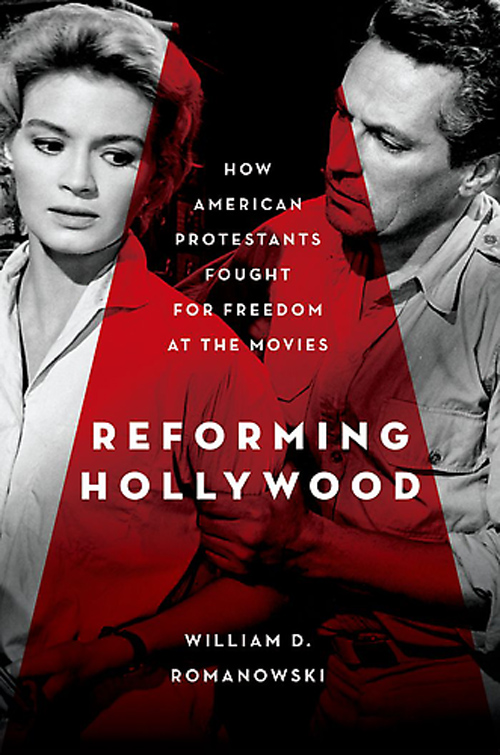 The new book, Reforming Hollywood: How American Protestants Fought for Freedom at the Movies (published by the prestigious Oxford University Press; $29.95) tells the story that he has been working on for more than a decade, a story that no one else has told heretofore. I am not just saying this, but it is truly seminal — anyone interested in the history of American cinema, anyone interested in the relationship of religion and film, will simply have to know this book. And some major scholars in the film history field say so, too.
The new book, Reforming Hollywood: How American Protestants Fought for Freedom at the Movies (published by the prestigious Oxford University Press; $29.95) tells the story that he has been working on for more than a decade, a story that no one else has told heretofore. I am not just saying this, but it is truly seminal — anyone interested in the history of American cinema, anyone interested in the relationship of religion and film, will simply have to know this book. And some major scholars in the film history field say so, too.
The story of how religious faith has influenced Hollywood—and it has been influential, believe it or not—has been told before. However, the standard tellings have focused on those of Jewish faith and the dramatic role of Roman Catholics. The story of how Protestants have influenced early Hollywood has not been told well, and when it has been mentioned, it has not been told accurately. It is complicated, and Rom
anowski is perfectly skilled to be able to tell it.
To get the story right, it is important that he is theologically aware–understanding fundamentalists and their instincts about culture as well as the more mainline denominations and their approaches. And he knows much about the earliest days of silent films, Nickelodeons, the epics, the different cinematic styles, and such. To make a long story short, as he poured over all kinds of archives one thing lead to another and soon he was becoming one of the leading experts on the ways in which church leaders did or didn’t address matters of censorship and ethics in the rising art-form known by some as the House of Dreams. He leaves no stone unturned (and no committee report unstudied) in this detailed investigation of who thought what, who did what, who paid for what, and which religious approaches held sway from the roaring twenties through the “new Hollywood” of the late 60s and 70s on through into the new, HD, 3D century.
Here is what this complex, thorough-going book explains: from the broad controversies of how the film industry was going to effect the values of Americans generally, to specific historic battles such as the infamous “damn” in Gone with the Wind, to even whether theaters were going to be permitted to be open on Sundays, American church leaders were actively involved. It is well known that there was the Legion of Decency of the Roman Catholics, but Romanowski shows that standard books on the subject overstate their role. Alas, it has long been taught (including in the major texts about film history) that Protestant Christians were similarly censorious. In a story that takes a whole book to unpack, the truth of the matter is that Protestant leadership disagreed (not unlike today) and there were vying organizations and colorful characters who represented different theological models for what Niebuhr would eventually call the “relationship of Christ and culture.” There were those lined up with what today we might think of as the pious, conservative, Christian right, and there were those who favored structural, incremental reforms. It is simply not so that most Protestants favored censoring or didn’t appreciate the power of cinema for the common good. Most favored self-regulation, and opposed censorship. You will notice the subtitle of his book, illustrating the heretofore largely untold story: how Protestants fought for freedom at the movies.
Early on, some church leaders saw film as a serious art-form, and as a valid way to raise in entertaining ways important issues about meaning and values ( and even to be used for Christian education!) Protestant leaders affirmed the independence of the film industry. Some of the boards and agencies disagreed just how to do that—and, yes, in the years of Prohibition there was this radical stream that was more strident and some opposed the movies (this portion of Reforming Hollywood might be best appreciated after viewing the tremendous Ken Burn’s documentary of the 1920s Prohibition.) Romanowski deftly walks us through the myriad of names and organizations and movements as film increasingly became a major influence in American society and as different sorts of church organizations manuevered for influence over production and distribution. Richard Maltby, surely one of today’s most significant film historians, has a very enthusiastic endorsement on the back of Reforming Hollywood, and reminds us how this book offers new insights, correcting how film history is considered. “This is a well-told story,” he writes, “with new perspectives and new information in every chapter.”
As the story unfolds—and there are truly fascinating side trips and important excursions and we meet stars and moguls, preachers and congressmen—we end up in more recent years, and the very important creation of what is now known as the rating system. Did you know that Protestants were very involved in the creation of what we all know as the rating system, an informative way of helping viewers understand the nature of any given film? (And do you see behind that a Christian insight about how social reforms ought not necessarily be censorious?) Here is a link to CARA, the Classification and Rating Administration, if you’re curious. Or visit the Motion Picture Association of America website for their “How to Read a Rating” section.
Romanowski landed an extraordinary audience and important interview with the hugely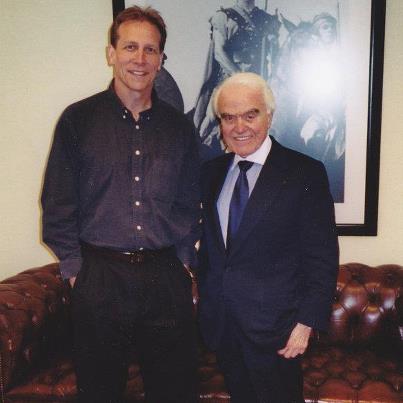 important head of the Motion Picture Academy, the influential and impeccable, late Jack Valenti, and he has long been friends with Reverend James Wall (who edited The Christian Century for a while, and was deeply involved in the ratings discussions in the 1960s and beyond for the National Council of Churches and who is a veritable treasure trove of information on the subject.) With these vital contacts, Romanowski gained access to even more quantities of previously unavailable letters and minutes of meetings and first-hand reports of behind-the-scene conversations. Maltby observes that “Romanowski reveals how Hollywood’s relationship to the Protestant establishment was crucial to debates around film regulation, and charts the erosion of its influence in the post-war years.”
important head of the Motion Picture Academy, the influential and impeccable, late Jack Valenti, and he has long been friends with Reverend James Wall (who edited The Christian Century for a while, and was deeply involved in the ratings discussions in the 1960s and beyond for the National Council of Churches and who is a veritable treasure trove of information on the subject.) With these vital contacts, Romanowski gained access to even more quantities of previously unavailable letters and minutes of meetings and first-hand reports of behind-the-scene conversations. Maltby observes that “Romanowski reveals how Hollywood’s relationship to the Protestant establishment was crucial to debates around film regulation, and charts the erosion of its influence in the post-war years.”
Different theological views of what constitutes a faithful Christian approach to any social or cultural engagement lie not far below the surface of different instincts and impulses and therefore goals and strategies of what it means to reform culture. Varying perspectives shaped how Protestants viewed what was becoming one of the most influential institutions in the world—the movies! By the 21st Century there were even more divergent approaches. Some on the far right were boycotting and protesting; just this week, the Southern Baptist LifeWay “Christian Stores” chain removed the movie The Blind Side from their for-sale inventory because of a cuss word. Others were courting Hollywood to make faith-friendly films (especially after the commercial success of The Passion of the Christ.) For some, acceptable contemporary faith-friendly films were like Left Behind and Fireproof, while others promoted the abolitionist story Amazing Grace and serious films like Bella and There Be Dragons. Again, Romanowski sleuthed out important voices, vital correspondence and conducted timely interviews with major players in the church and movie world as a new evangelical media movement unfolded. The book documents well some of the helpful and some of the not so helpful moves made by both evangelicals and mainline denominational folks, offering not only illuminating descriptions of their efforts but also his own suggestions for a wise and effective way to have reforming influences in a pluralistic world.
THREE REASONS YOU SHOULD BUY THIS BOOK.
Firstly, as I have explained, it is an example of top-shelf, uniquely Christian scholarship. Friends and fans of Hearts & Minds know that we think that the world can be well served, we can love our neighbors and make the world a better place, as some of us, informed by Biblical truth and insightful cultural discernment, become wise thought leaders. It is important that in each academic discipline and each sphere of life that ideas and ways of thinking about the field are shaped and guided by Christian insight. (This is part of what it means to be “sons and daughters of Issachar” of I Chronicles 12:32, part of what it mea
ns to be “salt” and “light” and “leaven,” and part of what it means to speak prophetic truth to all sorts of power.) This book is an example of a significant Christian scholar retelling the historical story of a significant aspect of American life and it deserves to be celebrated. This is one of the core values of the CCO, by the way, the campus ministry Bill and I used to work for, and remains central to his work as author and teacher and my work as bookseller: we need to nurture “the mind of Christ” and must find more young adults who will embrace the vocation of scholarship. (There cheers, here, for IVCF’s Emerging Scholar’s Network, by the way, designed to mentor and equip just such young Christian scholars to take up their calling in higher education.) Bill’s book is a fruit of this sort of work, and it should be honored. I would say this if it were a book with significant and refreshing new insights in science or business or family studies, too, of course; that it is about film history makes it, well, just a bit more fun. Who doesn’t have some interest in the glamor and drama of Hollywood? You should buy Reforming Hollywood because it is an important example of serious Christian scholarship.
Secondly, Reforming Hollywood is not only an example of distinctively Christian scholarship, relating faith and film history. It is a study of how to think about culture itself. Romanowksi has explored this in fairly philosophical ways in his significant Pop Culture Wars. He has presumed it in fairly practical terms in his upbeat and useful Eyes Wide Open. Here, he documents the strengths and weaknesses, the drama of success and failure, the unintended consequences and the goodness (and sometimes corruption) of Christian efforts to cause social change. In our day and age it is doubtlessly certain that we must grapple with what it means to be people of winsome fidelity regarding our own public lives, our own efforts to make a difference in the world around us. This studious, detailed narrative of how some of our forebears did or didn’t interact well with the powers that be (in this case, in the entertainment industry, from New York to L.A.) is instructive for anyone wanting to live out a transforming vision. Whether you are a fan of the American Family Association and their warnings of the vulgarity and secularism of many modern films (and their consequent campaigns of boycotts and protests) or are more of a fan of celebrations of common grace as seen in books like The Gospel According to Hollywood by Greg Garrett (W/JK; $17.00) or, say, The Dude Abides: The Gospel According to the Coen Brothers (Cathleen Falsani (WJK; $14.99) we can all learn from the past, gaining insight about how to engage well the culture around us. Certainly if you are drawn to public leadership and desire to impact the the world around you, knowing how best to accomplish certain helpful goals (just think of forming the rating system as one way to put morals and values on the table of filmmakers, movie studios, as well as the viewing public, and what it took to create that possibility) then, this book will be an informative and hepful resource. Romanowski, as a film historian, hints at ways that are faithful and ways that are not. You should consider Reforming Hollywood to learn about better ways of being involved in social change in a particular field.
Everybody should read a serious book about history now and then. It is good to know our past and to exercise our gray matter thinking about how we got were we are, so to speak. It’s just good to read a great, academic book and fancy yourself a life-long learner. This book will help you be smarter and a more interesting conversationalist when your talking about the movies or American social history.
 Since this is a major scholarly work published by the world’s most prestigious publishing house, it is not a tract for evangelical renewal or a formula for cultural reformation. But for those with ears to hear, there is a striking invitation in the closing pages. When Romanowski gives a brief reminder of the fast-changing pace of technical innovations and new delivery systems and notes the troubling shift in the commonplace nature of vivid sex and violence in many films, always aware of the commercial aspects of the business of box office, he ends the book with a call for readers to be informed and aware of the long view and broad perspective needed to offer genuinely lasting insight. I might have wished for more, more ideas about what to do, lessons learned, a reforming strategy spelled out for viewers and producers, too. But, alas, that is not the sort of book this is; perhaps, like his beloved movie industry we must use our imaginations in the dark; like his beloved mentor Calvin Seerveld might say, we must learn to appreciate the allusive quality of the arts in God’s world. Reforming Hollywood is indeed a scholarly book of data and facts and people and history and stories and controversies. It offers much learning about our cultural past. But it is also a work of (scholarly) art. And artfulness, in movies and in books, leaves something to the imagination. This book will stimulate your imagination, and for that reason, too, it is well worth buying, well worth reading, and well worth pondering.
Since this is a major scholarly work published by the world’s most prestigious publishing house, it is not a tract for evangelical renewal or a formula for cultural reformation. But for those with ears to hear, there is a striking invitation in the closing pages. When Romanowski gives a brief reminder of the fast-changing pace of technical innovations and new delivery systems and notes the troubling shift in the commonplace nature of vivid sex and violence in many films, always aware of the commercial aspects of the business of box office, he ends the book with a call for readers to be informed and aware of the long view and broad perspective needed to offer genuinely lasting insight. I might have wished for more, more ideas about what to do, lessons learned, a reforming strategy spelled out for viewers and producers, too. But, alas, that is not the sort of book this is; perhaps, like his beloved movie industry we must use our imaginations in the dark; like his beloved mentor Calvin Seerveld might say, we must learn to appreciate the allusive quality of the arts in God’s world. Reforming Hollywood is indeed a scholarly book of data and facts and people and history and stories and controversies. It offers much learning about our cultural past. But it is also a work of (scholarly) art. And artfulness, in movies and in books, leaves something to the imagination. This book will stimulate your imagination, and for that reason, too, it is well worth buying, well worth reading, and well worth pondering.
Here is a shorter review of Reforming Hollywood which I wrote for Comment magazine.
Watch this short video clip of Romanowski talking about the intellectual detective work he did in researching this book. Very interesting!
.
DISCOUNT
any book mentioned
2O% off
order here
takes you to the secure Hearts & Minds order form page
just tell us what you want
inquire here
if you have questions or need more information
just ask us what you want to know

Byron,
Thanks so much for this. Living high in the Swiss Alps at L’Abri, where Bill was due to visit, sometimes makes it difficult to be aware of what’s happening in the book publishing world.
You write so well, you ought, if you already have not, publish your own book!